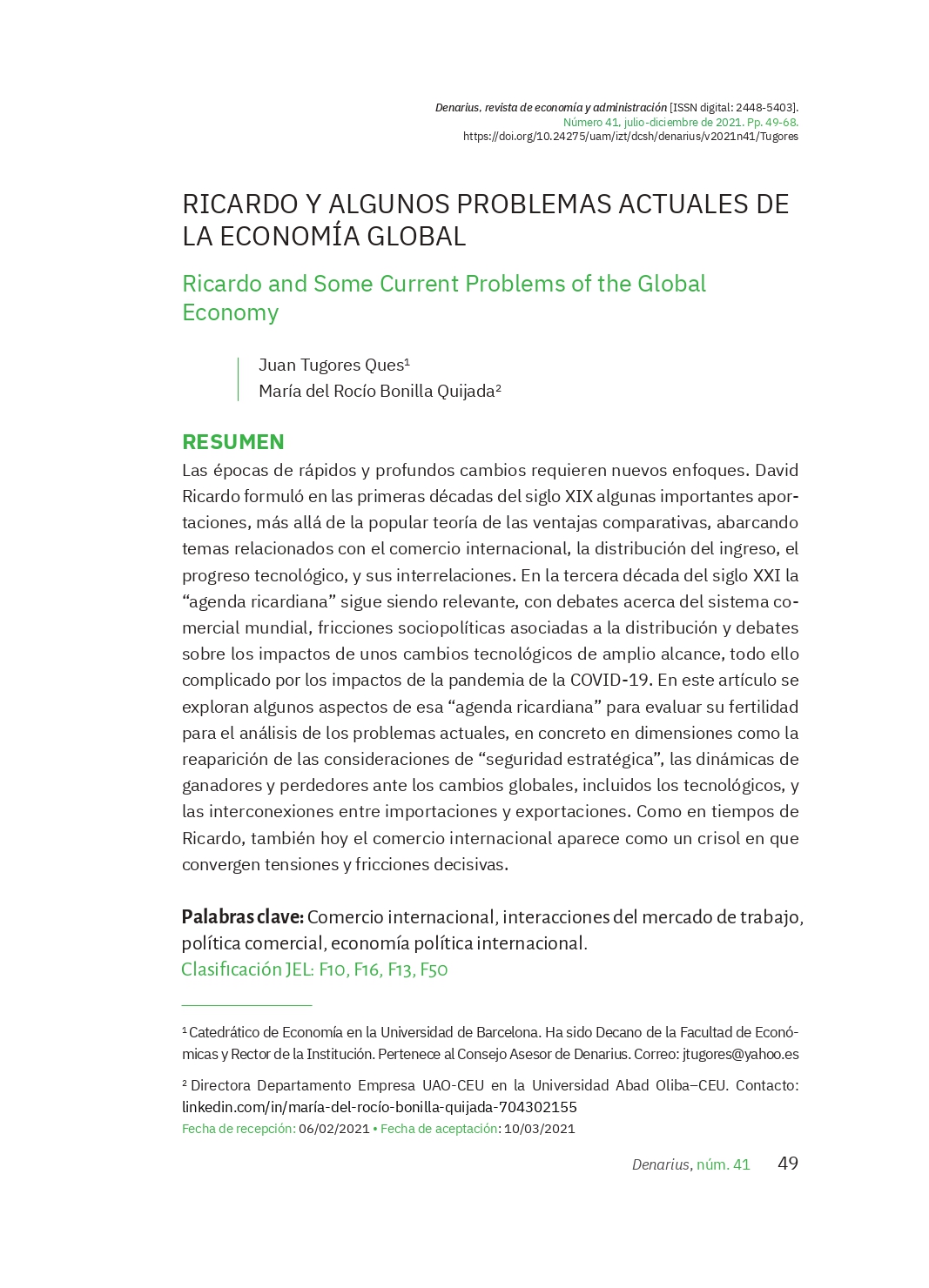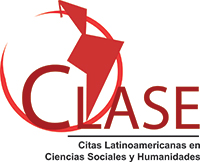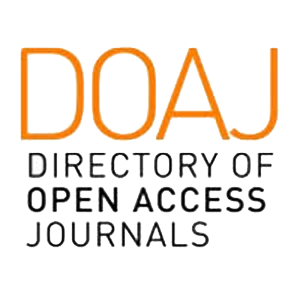Ricardo and some current problems of the global economy
Abstract
Times of rapid and profound change call for new approaches. David Ricardo made some important contributions in the first decades of the 19th century, beyond the popular theory of comparative advantages, covering issues related to international trade, income distribution, technological progress and their interrelations. In the third decade of the 21st century, the “Ricardian agenda” continues to be relevant, with debates about the world trading system, socio-political frictions associated to distribution, and debates about the impacts of wide-ranging technological changes, all complicated by the COVID-19 pandemic. This article explores some aspects of this “Ricardian agenda” to evaluate its fertility for the analysis of current problems, specifically in dimensions such as the reappearance of “strategic security” considerations, the dynamics of winners and losers in the face of global changes, including technological, and the interconnections between imports and exports. As during Ricardo’s time, international trade also appears today as a crucible in which decisive tensions and frictions converge.
Downloads
References
Acemoglu, D. (2021). “Remaking the Post-COVID World”, Finance & Development, FMI, marzo 2021. Accesible desde: https://www.imf.org/external/pubs/ft/fandd/2021/03/COVID-inequality-and-automation-acemoglu.htm
Akcigit, U. et alia (2021). “Rising Corporate Market Power: Emerging Policy Issues”, IMF Staff Discussion Note, SDN 21/01, marzo 2021. Accesible desde: https://www.imf.org/en/Publications/Staff-Discussion-Notes/Issues/2021/03/10/Rising-Corporate-Market-Power-Emerging-Policy-Issues-48619
Baldwin, R. (2019). The Globotics Upheaval – Globalization, Robotics and the Future of Work. Oxford, Oxford University Press.
Banco Mundial (2020). World Development Report 2020 – Trading for Development in the Age of Global Value Chains. Accesible desde: https://www.worldbank.org/en/publication/wdr2020
Blyde, J. (coordinador) (2014). Fábricas sincronizadas – América Latina y el Caribe en la era de las cadenas globales de valor. Banco Interamericano de Desarrollo. Accesible desde: http://www10.iadb.org/intal/intalcdi/PE/2014/14895es.pdf
Bonilla, M. R. (2015). “El Impacto de las Cadenas Globales de Valor en la Economía Española (1995-2009)”. Tesis Doctoral, Universitat Abat Oliba, Barcelona.
Evenett, S. et alia (2021). “The Covid-19 Vaccine Production Club: Will Value Chains Temper Nationalism?”. WB Research working paper. Banco Mundial, marzo. Accesible desde: https://www.globaltradealert.org/reports/65
FMI (2019a). Informe art. IV, Germany. Accesible desde: https://www.imf.org/en/Publications/CR/Issues/2019/07/09/Germany-2019-Article-IV-Consultation-Press-Release-Staff-Report-and-Statement-by-the-47093
FMI (2019b). External Sector Report 2019. Accesible desde: https://www.imf.org/en/Publications/ESR/Issues/2019/07/03/2019-external-sector-report
FMI (2020). 2020 External Sector Report: Global Imbalances and the COVID-19 Crisis. Accesible desde: https://www.imf.org/en/Publications/ESR/Issues/2020/07/28/2020-external-sector-report
FMI (2021). World Economic Outlook. Abril 2021. Accesible desde: https://www.imf.org/en/Publications/WEO/Issues/2021/03/23/world-economic-outlook-april-2021
Grossman, Gene y Rossi-Hansberg, Esteban (2006). “The Rise of Offshoring: It’s Not Wine for Cloth Anymore”. Symposium Jackson Hole. Accesible desde: https://ideas.repec.org/a/fip/fedkpr/y2006p59-102.html
Klein, M. y Pettis, M. (2020). Trade Wars are Class War: How Rising Inequality Distorts the Global Economy and Threatens International Peace. Yale University Press.
OECD (2018). Trade in Value Added. Accesible desde: https://www.oecd.org/sti/ind/measuring-trade-in-value-added.htm
OCDE (2021). “Using trade to fight COVID-19: Manufacturing and distributing vaccines”, febrero. Accesible desde: http://www.oecd.org/coronavirus/policy-responses/using-trade-to-fight-covid-19-manufacturing-and-distributing-vaccines-dc0d37fc/?utm_source=Adestra&utm_medium=email&utm_content=Read%20More&utm_campaign=Trade%20March%202021&utm_term=tad
OCDE (2021). “Global Value Chains: Efficiency and Risks in the Context of COVID-19”. Febrero. Accesible desde: http://www.oecd.org/coronavirus/policy-responses/global-value-chains-efficiency-and-risks-in-the-context-of-covid-19-67c75fdc/?utm_source=Adestra&utm_medium=email&utm_content=Read%20the%20brief&utm_campaign=Trade%20March%202021&utm_term=tad
Ricardo, David (1815). “An Essay on the Influence of a low Price of Corn on the Profit of Stock with Remarks on Mr. Malthus’s two last publications”. Edición en español, en Piero Sraffa (1960), editor, David Ricardo: obras y correspondencia, Vol. IV. México, Fondo de Cultura Económica.
_______ (1817, 1821). Principios de Economía Política y Tributación, edición en español a partir de la tercera edición inglesa 1821) en Piero Sraffa (1959), editor, David Ricardo: obras y correspondencia, Vol. I. México, Fondo de Cultura Económica.
_______ (1822). “On Protection to Agriculture”. Edición en español, en Piero Sraffa (1960), editor, David Ricardo: obras y correspondencia, Vol. IV. México, Fondo de Cultura Económica.
Tugores, Juan (2014). “Desequilibrios externos globales y cooperación internacional: ¿dónde estamos?”. Estudios de Economía Aplicada, septiembre de 2014. Accesible desde: http://www.revista-eea.net/documentos/32308.pdf
Tugores, J. y Bonilla, M. R. (2020). “Comercio, distribución y crecimiento: una aproximación ricardiana a problemas actuales”, Revista de Economía Mundial, 55. Accesible desde: http://www.uhu.es/publicaciones/ojs/index.php/REM/article/view/3828/0
UNCTAD (2020a). World Investment Report 2020 – International Production Beyond the Pandemic, United Nations. Accesible desde: https://unctad.org/system/files/official-document/wir2020_en.pdf














